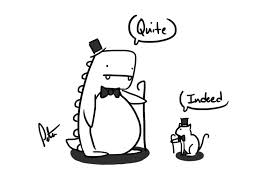中文词源
quite 十分,相当
来自中古英语quit,quite,结清债务的,自由的。引申副词词义整个地,十分,相当。词义演 变比较even,just,very.
英语词源
- quite
-
quite: [14] Quite is essentially the same word as the adjective quit ‘free, absolved, discharged, cleared’ (which in Middle English commonly took the alternative form quite). It came to be used as an adverb meaning ‘thoroughly, clearly’. The weaker modern sense ‘fairly’ did not develop until as recently as the mid-19th century.
=> quit - quite (adv.)
- early 14c., adverbial form of Middle English quit, quite (adj.) "free, clear" (see quit (adj.)). Originally "thoroughly;" the weaker sense of "fairly" is attested from mid-19c.
权威例句
- 1. Failure is never quite so frightening as regret do.
- 比失败更令人恐惧的是懊悔。
- 2. I know it's nothing serious and I feel quite unemotional about it.
- 我知道那根本没什么大不了的,所以有些无动于衷。
- 3. I would imagine she's quite lonely living on her own.
- 我猜想她一个人过肯定很孤独。
- 4. I got quite a lot of ribbing from my team-mates.
- 队友们经常开我的玩笑。
- 5. She was afraid in a way that was quite new to her.
- 她感到从未有过的害怕。
